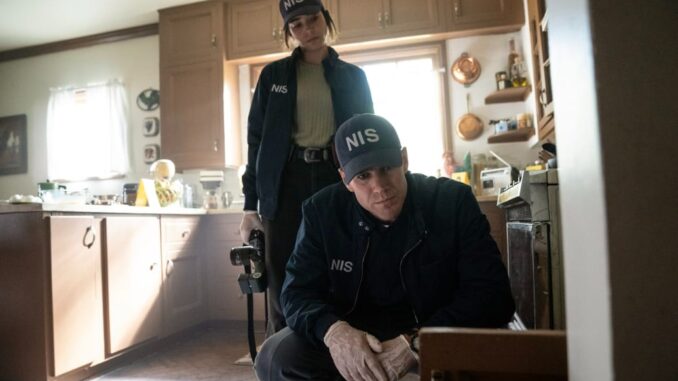
I had only seen one episode of NCIS before I watched NCIS: Origins. This is not a brag; normally, as a reviewer, I’d try to conceal my ignorance as best as possible. Ideally, I’d take time to catch up on episodes of the original before attempting to discuss the prequel in order to place the series in its proper context. In this case, that wasn’t necessary, because NCIS: Origins is an all-you-can-eat buffet of cop clichés. If you’ve ever seen a procedural, on film or on TV, you’ll be able to follow this one just fine.
Monday night’s two-part series premiere, “Enter Sandman,” opens with the first of many folksy aphorisms—this series’ love language. “My dad used to say, ‘Wherever you go, there you are.’ I guess he was right,” Mark Harmon, whose return to the series is a huge deal according to the Variety articles I read in anticipation of this review, growls in voiceover over closeup shots of grizzled hands building a fire in the wilderness. This refers to the arc of his character, Leroy Jethro Gibbs, a fan favorite whose backstory as a Marine sniper-turned-Navy cop is explored in NCIS: Origins. He keeps running, but his problems keep catching up with him. Maybe he should try therapy?

He does have a lot to unpack. As NCIS: Origins begins, Gibbs (played here by Austin Stowell) is a young man who has just been assigned to the NIS (Naval Intelligence Service; the “C” for “criminal” was added later) at Camp Pendleton in California after returning home from a tour of duty in Iraq. (The first time around—Origins is set in 1991.) It’s mentioned several times that Gibbs failed his psych evaluation before taking the NIS job, and he really has no business carrying a gun. But he does carry one. And he’s a steadier shot than the rest of them, trauma be damned.
You see, while Gibbs was away in Iraq, his wife and daughter were murdered. (Why? Because a man needed a motivation, duh.) It’s presumed that the viewer already knows this bit of Gibbs lore, which is not reenacted on screen. What we get are shots of empty rooms with toys on the floor, and a flashback where the older Gibbs monologues about gut instincts while the younger Gibbs leaves home to report for duty. His daughter salutes him in the rearview mirror as he drives away. It’s a cheap sentiment, but it’s not as bad as the visual metaphor of Gibbs trying—and failing—to pull his wedding ring off of his swollen finger. His knuckles are battered, because he got into a bar fight the night before he started at the NIS. A noble one, naturally.
There have been 46 seasons of NCIS spread across five franchises—Origins is the sixth—but the show keeps coming back to Gibbs. He’s a stoic character, and an essentially conservative one. He respects authority but has little patience for bureaucracy, which lands him in a cowboy-like “good guy with a gun” category that feels most comfortable to those who believe that a) there’s such a thing as clearly delineated “good guys” and “bad guys,” and b) they will always fall on the “good guy” side. Older white men, a key demographic for both NCIS and CBS in general, often fall into this group.

This series will do little to challenge its core audience’s mindset, as NCIS: Origins takes the stereotypical traits of the John Wayne-style lawman and expands them into an all-encompassing worldview. This show hates reporters and the FBI, both seen as parasites trying to stop the real work happening on the ground. Fancy boys and empty suits secretly envy the gut instincts of the hardened investigator, whose instincts are never wrong and are always won through experience. And in Gibbs’ profession, experience is synonymous with bloodshed: “Sometimes a lot of men have to die for you to learn to trust your gut,” the older Gibbs growls.
Gibbs’ boss Mike Franks (Kyle Schmid) is very much on the same page when it comes to protocol and instinct. A more sharply written show might explore whether Gibbs’ perspective is influencing his recollections, or how much Franks’ influence shaped Gibbs’ attitude towards his life and work. On Origins, it’s once again about reinforcing the audience’s beliefs, as Franks’ no-nonsense attitude makes him a beloved and respected figure amongst his team. It also provides a conduit for more folksy aphorisms: “You two are fighting like a couple of buck-toothed chinchillas,” Franks admonishes two of his agents at one point.
Another gesture toward comfort and familiarity comes in the formation of the team that will support Gibbs, Franks, and their colleague Special Agent Lala Dominguez (Mariel Molino), who we’ll get to in a minute. One thing I do know about NCIS is that Pauley Perrette played a goth forensic scientist with cute bangs on the show for forever (15 years, according to IMDb). And Origins gives us her ’90s counterpart, a pink-haired forensic scientist who’s molding a skull out of clay with obvious delight in the first episode.
There aren’t many ghoulish shots of desiccated corpses in the four episodes of NCIS: Origins that were screened for critics, but there is a darkly humorous streak. A scene where the NIS crew laughs at a suspect’s belief in Mothman is amusing. But the use of “Eternal Flame” as Franks’ “pump-up music” as he’s investigating a case where a woman was shot and her corpse lit on fire is thoughtless, tasteless, or perhaps a little of both.
That being said, it plays better than a fumbled subplot where Dominguez’s concern about sexism in the NIS is dismissed by Franks as a “distraction.”. “Honey, I looooove women,” he says, which is what men who aren’t sexist say when a female colleague trusts them with their thoughts about a workplace issue. He then accuses her of acting like “a bitch in heat” around Gibbs, when she just told him that she’s worried about being passed over for a promotion now that he’s on the team.
They’ll all go out for beers afterwards, and generic rock riffs will play on the soundtrack at the bar. Dominguez, ever the tough chick, will cry, “Shots on me, boys!” as Gibbs sits alone at a table and stares into his bottled domestic. The origins of NCIS will play out much like the previous 21 seasons of the show and its spin-offs, because nobody tunes in to the sixth incarnation of a long-running procedural for something challenging. They tune in for lovable characters, familiar scenarios, and messaging that confirms what they already believe to be true about crime and law enforcement. In this sense, NCIS: Origins is a success.